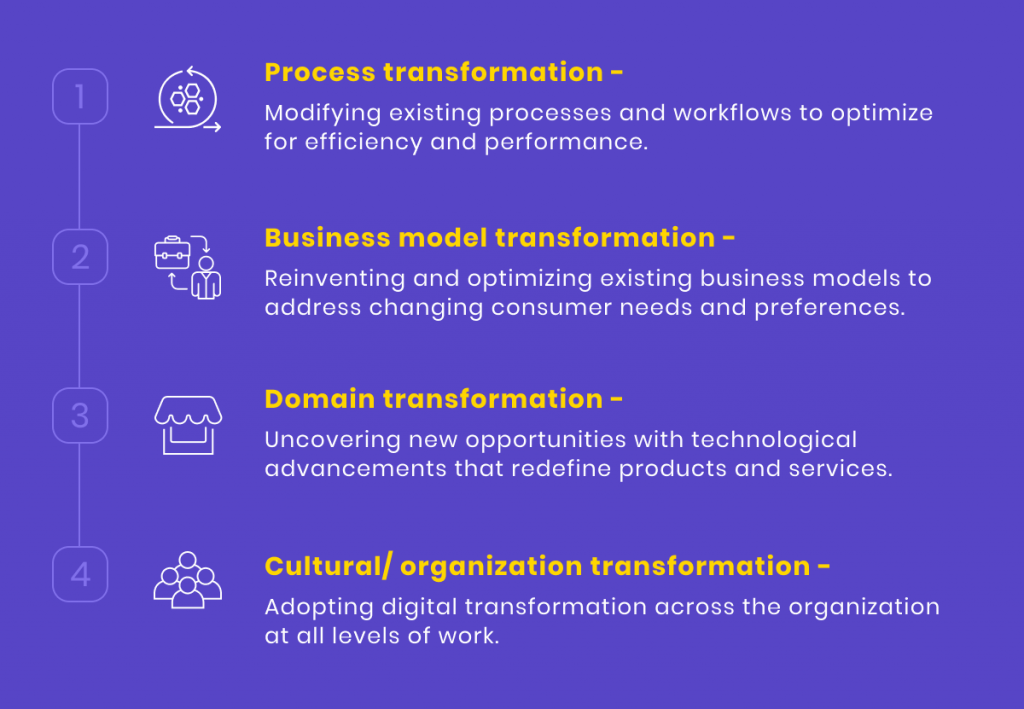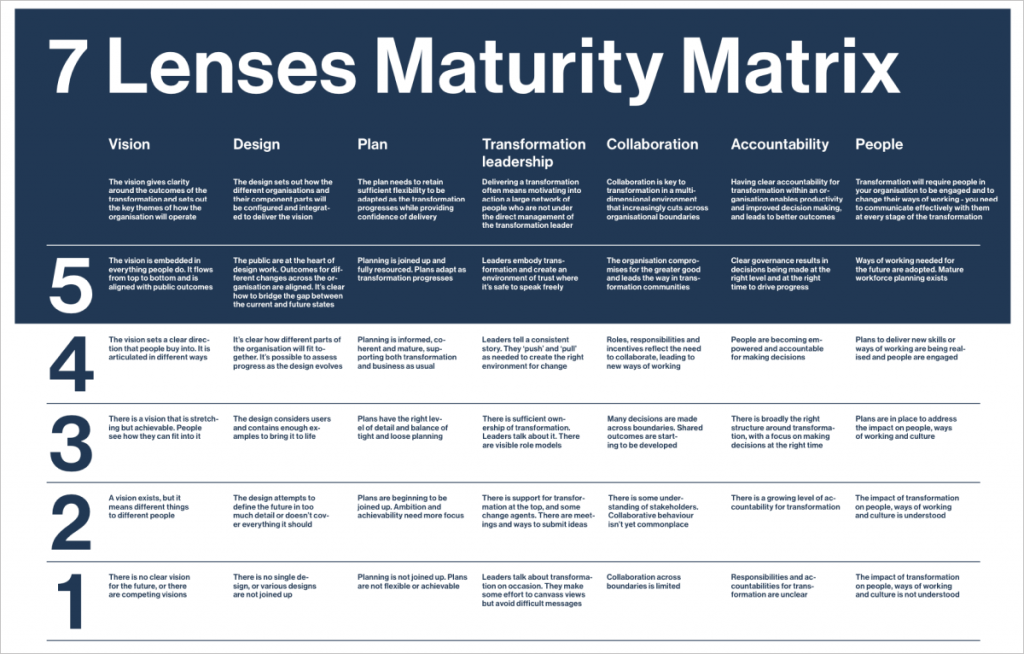With businesses becoming more consumer-focused, digitization has become a top priority to business leaders. As per surveys, about 75% of businesses view digital transformation as a means of boosting business revenue and being truly consumer-centric, contrary to the traditional cost-cutting measures.
But surveys have also found that not all digital transformation efforts have been successful. Most were driven by the pressure to adopt digitization by industry peers and consumers, leading to incomplete or faulty digital transformation.
A study by McKinsey indicates that the success rate for digital transformation has been at a consistent 30% mark. There are also some industries like pharmaceuticals that see a further dip in the number to about 11%, despite the technological advancements around them.
In this article, we’re going to take a look at the common challenges organizations face when it comes to digital adoption, what staggers or halts their efforts and how you can get back on track to succeed.
- What is digitization?
- The pandemic forces businesses to adopt digitization
- The most common digitization challenges
- Tips to overcoming digitization challenges
- Conduct an audit to discover identify your needs and challenges
- Prioritize your current and future needs
- Research the options available to you
- Create a well-documented strategy
- Invest in a digital adoption platform
- Create a digitization team
- Onboard a digitization consultant
- Focus on agility
- Make customers delight your epicenter
- Conclusion
What is Digitization?
Digitization refers to the process of using digital technologies to create or optimize existing business processes, culture, and the overall customer experience being delivered. It is a journey to adopt modern technologies to meet business requirements and market expectations. This may include the simplest of measures like embracing cloud-based technologies for better usage of data and collaboration between employees, setting up new employee working models to adapt to current situations like the pandemic or moving your business online to sell digitally.
There are four main areas of digital transformation include:
- Process transformation: Modifying existing processes and workflows to optimize for efficiency and performance.
- Business model transformation: Reinventing and optimizing existing business models to address changing consumer needs and preferences.
- Domain transformation: Uncovering new opportunities with technological advancements that redefine products and services.
- Cultural/ organization transformation:Adopting digital transformation across the organization at all levels of work.
The pandemic forces businesses to adopt digitization
The lockdowns, rules and regulations, and restrictions imposed by the government across the world, resulted in traditional organizations bearing a major setback. They were forced to rapidly innovate and find newer ways of operating in a world that was increasingly moving to digital.
According to a study by Forrester, about 67% of organizations accelerated their digital transformation strategy due to and during the COVID-19 crisis.
Think about how the pharmaceutical industry and food retail industry has changed in the last two years. From consumers walking into stores to buy their daily essentials, every little purchase was made online.
While businesses definitely unearthed a number of benefits from digital adoption, including being able to reach their customers faster, enhance operational efficiency and generate more revenue, most did not have the time to map out a clear strategy for digitization.
They simply moved with the times to meet consumer demand and industry changes with what they could.
The forced and rapid digitization led to complexities in many operations and processes such as supply chain management, data management, and the overall security of the organization.
Let’s take a look at the challenges in digital transformation a little more in detail.
The most common digitization challenges
Digital transformation comes with a number of benefits associated with it. But it also comes with a need to strategically think through business processes and apply critical thinking while adopting digital solutions. This is where most businesses face a challenge.
1. Charting out a digitization strategy
According to McKinsey’s survey, misinformed transformation strategy and a lack of clarity were the two leading challenges for companies to overcome. They stated that having a clear understanding of digitization, a vision, and well-defined goals are crucial to a successful digital transformation.
An effective digital transformation strategy should involve assessing the current needs and challenges of the business, identifying the root cause of inefficiencies, researching and shortlisting best solutions, and creating a well-documented plan for implementation of those solutions. Most businesses did not get the time to complete all stages during the pandemic, leading to failures or not being able to tap into the full potential of digitization.
2. Complex digital solutions
With technological advancements, digital solutions have taken a complex turn as well. While they solve a number of challenges for a business, they are also overwhelmingly difficult to get started with – sometimes, taking months to complete an end-to-end implementation to address a single business process.
Digital solutions solve a number of challenges for a business but they are also overwhelmingly difficult to get started with. Read more - via @webengage Share on XThen there is also the complexity of integrating with existing business stacks.
Businesses haven’t been able to discover more intuitive and integrated systems owing to the lack of time and resources, leading to disruptions in the smallest of things like how data flows within the organization.
3. Navigating organizational pushback
Businesses that have been running for years, often see pushback from their employees when they change processes. This is owing to the habitual way of working as well as the comfort employees, as well as stakeholders, find in the existing processes, which results in incomplete or slow adoption of digital transformation.
Organizations that have not been able to reap the benefits of digital transformation are typically ones that were not able to get ‘everyone’ onboard. They’re running processes in siloes, leading to limited use cases and inefficiencies caused when collaborating with non-digitized departments.
4. Lack of skills for digitization
A study by Futurum Research found that 26% of companies say lack of employee skills has been a major challenge in their digital transformation. With new technologies and processes, comes a need to continually upskill and learn the various aspects of digitization.
Businesses have faced challenges in hiring data-driven roles such as business analysts, cloud technology architects, IT managers, cybersecurity analysts, and similar, leading to discrepancies in the infrastructure set up for digital transformation. In fact, 54% of organizations said they are not able to accomplish their digital transformation goals due to a lack of technically-skilled employees.
5. Adapting to evolving consumer needs
The pandemic has changed consumer behavior and altered their expectations from businesses. They don’t just expect good quality of products and services, but also better personalization of their journeys, faster responses, and availability across multiple channels of preferences, to name a few.
This puts pressure on businesses to not just embark on their journey to digital transformation, but also continually optimize it to meet the rising and fast-changing consumer needs. But most organizations still view digital transformation as a one-time project, bringing rigidity into processes that need to be more agile to keep up with the ever-expanding digital landscape.
Most organizations still view digitization as a one-time project. Read more - via @webengage Share on X6. Leverage available data
Whether online or offline, most organizations have heaps of data available in their existing systems – industry, business, and customers. But surveys have found that only 24% of businesses think their organizational processes are data-driven, making them less confident about using their data for digital transformation.
Organizations haven’t been able to collate insights from different systems such as their CRM, ERP, customer support tools, and more, deriving actionable in silos as well as in a more comprehensive manner. This has resulted in making misinformed decisions while adopting digital technologies to solve the current and future needs of the business.
7. Understanding and navigating cybersecurity risks
A Cybersecurity Ventures research report that an estimated $10.5 trillion is estimated to be lost to cybercrime by 2025 globally.
It also found that there has been a 180% increase in cloud security incidents recorded from the second quarter of 2020, up until now and the number is predicted to go higher with every passing year.
Businesses are not able to completely understand the cyber threats they are prone to. This has resulted in them not being able to implement security strategies to keep their data secure while adopting new technologies and moving to new platforms for digitization.
8. Lack of budgets for digitization
Owing to all the above challenges, businesses need to continually change their scope of digital transformation. This results in implementing strategies and adopting tools they may not have budgeted for initially. The creep or expansion of the scope slowly leads to delays in digitization, which further prolongs when the business can start repeating the benefits of digital transformation.
Changes in consumer needs, IT errors and similar mistakes due to a lack of digital transformation strategy have led to increased costs. The lack of budgets to evolve has slowed down or halted digital transformation for most.
The above challenges have also been major pitfalls for businesses embarking on their digital transformation journeys. But with the pandemic slowly settling down, businesses now have the opportunity to strategize digitization better and circumvent the above challenges.
Subscribe to our newsletter to stay updated on the latest in B2C marketing
Tips to overcoming digitization challenges
Taking a look into the successful digital transformation stories, here’s what we have learned about keeping your efforts streamlined and strategically planned.
1. Conduct an audit to discover identify your needs and challenges
Look into your current business processes and conduct a thorough audit of the same on all fronts.
Take a look into how efficient the processes are and the results they have been yielding over a defined period of time. The goal is to identify loopholes and opportunities in your existing processes before starting out with digitization.
2. Prioritize your current and future needs
Once you have uncovered where your business lags, you need to prioritize how you want to adopt digital transformation. Take into account both your current and future needs, and categorize them based on the amount of impact they have on your business growth.
3. Research the options available to you
Before starting to adopt digital tools, look into what other businesses in the same or similar industry are making use of. Also take a look at all the alternate solutions and paths available to you, exploring each in detail – both in terms of resources available to you and the time it will take for you to implement them.
4. Create a well-documented strategy
The next step is to document how you want to address your digital transformation needs and align the same with your overall business objectives/ goals. It’s important for everyone in the organization to understand the intent behind digital transformation and the key performance indicators of success. This helps everyone stay aligned with all the efforts being made across the organization, no matter how big or small.
Also, make sure you’re assigning clear timelines for execution and keeping leeway for errors. This will help you keep scope creep at bay and optimize your resources.
Smart Insights has created a clear template and explanation of each stage that you can use as the base framework for your strategy:
5. Invest in a digital adoption platform
Digital transformation is not just about adopting new technologies and altering your existing workflows. The success of digitization is also dependent on how effectively you’re able to implement and then use the new digital processes to aid your business objectives and goals.
You’ll need to provide proper pre-boarding, onboarding, training and support to your employees throughout the journey. That’s where investing in a digital adoption platform (DAP) comes into play.
A good DAP provides the organization with tools to create contextual onboarding journeys for their employees across various departments and processes. This includes creating documented explanations of solutions and their use cases, interactive walkthroughs and user flows, product tours, and setting up detailed knowledge bases. It is also a good idea to continually build a repository of FAQs around the technology stack you adopt.
6. Create a digitization team
Take a good look at your existing team and identify those who have been proactively engaging with other employees, and influencing their decisions. The goal is to identify key members who can be held accountable for the adoption of digital processes and tools in every department. Ideally, these should also be people who have a complete understanding of your business objectives and the roles they are responsible for.
Having a digital transformation team allows organizations to proactively implement digitization and ensure alignment.
7. Onboard a digitization consultant
Digital transformation is not a one-time project. Every action or step you take has an impact on the overall success of your digitization strategy. That makes the journey extremely overwhelming for fast-growing businesses.
It is a good idea to onboard a digital transformation consultant who comes with prior experience in the same. The expert should help you see through creating as well as implementing your digital transformation strategy, providing you a concrete foundation and framework for success.
8. Focus on agility
Adapting to the rapidly changing consumer needs and preferences is important for the success of a digital transformation strategy. It’s important that you ensure change and innovation is a continual process in the organization.
Make sure that your strategy is agile and has the ability to adopt new processes, technologies, and workflows without changing the core framework and the business objectives you want to address.
9. Make customers delight your epicenter
While digital transformation is focused on bringing efficiency across the organization, it is also meant to address the changing consumer expectations. If you want to ensure your digital transformation strategy is a success, keep customer delight at the epicenter of all your decisions. Your internal, as well as external-facing processes, need to be optimized to deliver a positive customer experience.
Apart from market and industry research, you need to make continual customer feedback a part of the process.
Feedback from customers will help you uncover insights that may go unnoticed otherwise. So make sure you equip your team with the right digital tools to proactively collect customer feedback and derive insights from the same.
Conclusion
Digitization is a detailed process and an extensive journey that businesses need to embark on. But with the ever-evolving market needs and technological advancements, coping with digitization can be overwhelming and prone to mistakes.
It’s important for businesses to strategically think through their need for digitization, keeping their values and core objectives at the center of everything they do. But at the same time, it also emphasizes the importance of embracing data in day-to-day processes to make them more optimized for performance and success.
Take a demo with WebEngage and Make WebEngage Your First Step in doing Digitization Right!




































 Surya Panicker
Surya Panicker
 Prakhya Nair
Prakhya Nair







